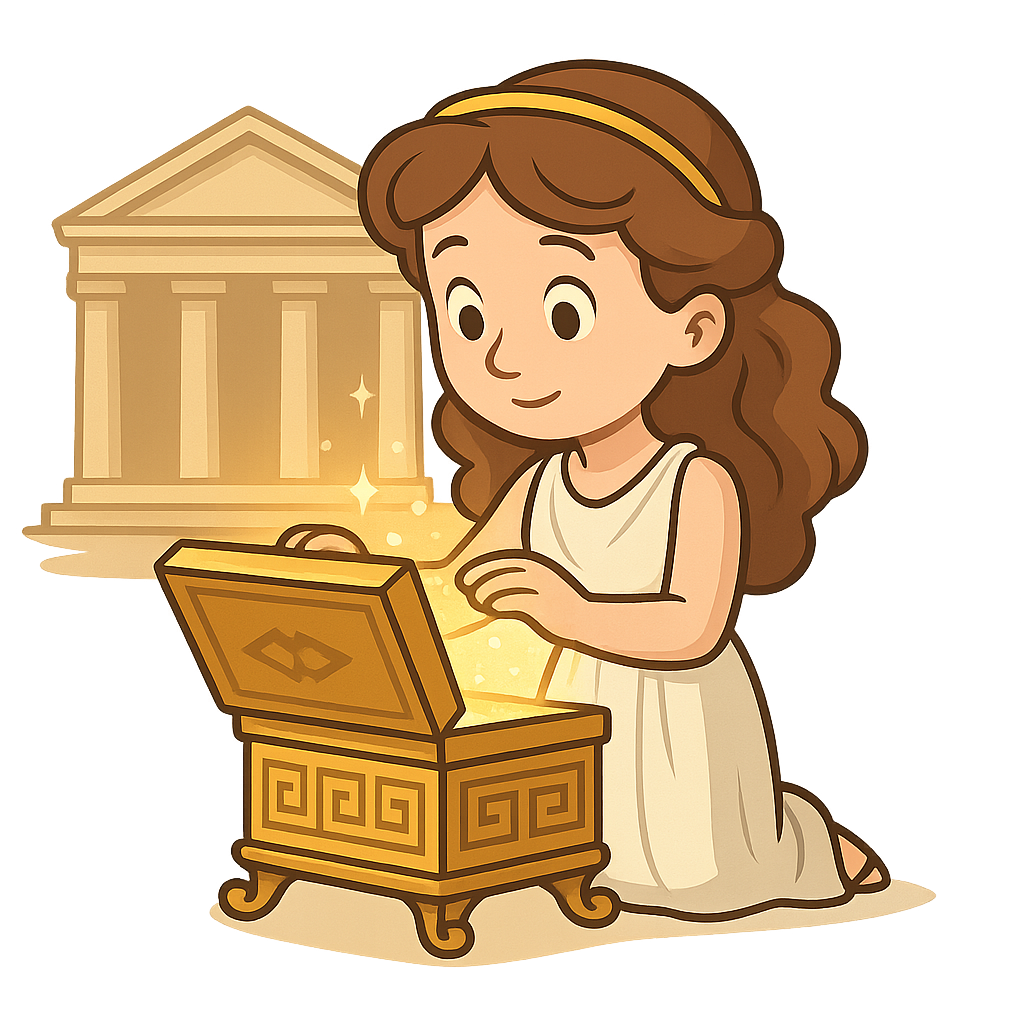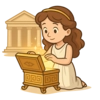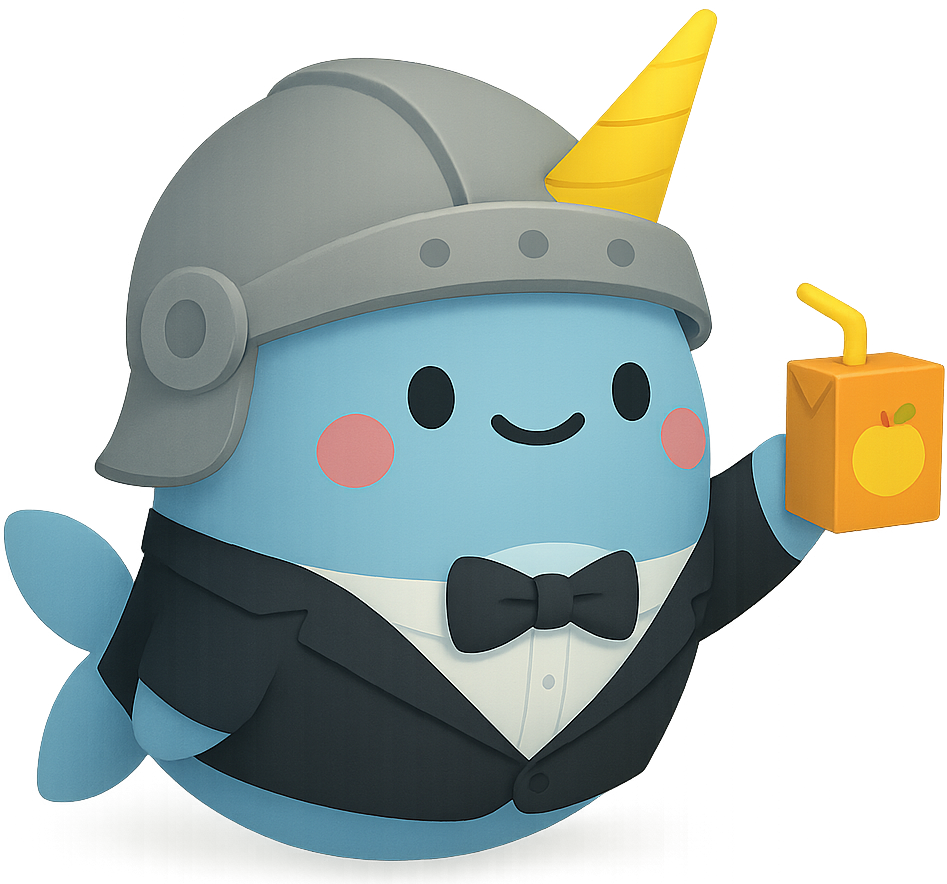The Story of Pandora's Box
My story begins in a world painted with sunshine, where laughter was the only music and worries hadn't yet been invented. My name is Pandora, and I was the very first woman, crafted from earth and water by the gods of Mount Olympus themselves. They gave me many gifts—beauty from Aphrodite, wisdom from Athena, and a clever tongue from Hermes—but the most curious gift of all came from Zeus, the king of the gods. He presented me with a heavy, ornate box, sealed tight with a golden latch, and warned me with a stern look, 'Never, ever open this.' This is the story of Pandora's Box. I was sent to live on Earth with a kind man named Epimetheus, and our days were perfect. We would wander through endless fields of wildflowers and listen to the sweet songs of birds who had no reason to be afraid. But no matter how wonderful everything was, my eyes always drifted back to that mysterious box. It sat in the corner of our home, humming with a secret energy that pulled at my thoughts. What could possibly be inside? Was it sparkling jewels that glittered like fallen stars? Magnificent gowns spun from moonlight? Or was it something else entirely, something the world had never seen before? The not-knowing was a little itch I couldn't seem to scratch, and the more I tried to ignore it, the bigger the mystery became.
Days turned into weeks, and my curiosity grew like a mischievous vine, wrapping tightly around my thoughts until I could think of nothing else. Epimetheus had been warned by his clever brother, Prometheus, to never accept gifts from Zeus, but he had welcomed me with such an open and loving heart. He trusted me completely, and I felt a sharp pang of guilt every time my fingers brushed against the cool, smooth lid of the box. Sometimes, late at night when the world was quiet, I thought I could hear tiny whispers seeping from inside—faint, scratchy voices begging to be let out. 'Just a peek,' a sly voice in my own head would say. 'What harm could one tiny look do? No one will ever know.' I tried my best to ignore it. I would go outside, tend to the fragrant garden, or walk by the babbling stream, but the mystery of the box followed me like a persistent shadow. One sweltering afternoon, when the sun was a blazing coin in the sky and Epimetheus was away exploring, I couldn't resist any longer. My hands trembled as I knelt before the box. I convinced myself I would just lift the lid for a single second, just long enough to silence the whispers and satisfy my curiosity. Can you imagine how tempting that was? With a deep breath, I slowly, carefully, unfastened the gleaming golden latch. The moment the lid lifted, a deafening rushing sound filled the air, like a great and terrible wind. It wasn't jewels or gowns that flew out, but a swarm of dark, shadowy things. They looked like millions of gray moths with tattered wings, buzzing and darting into every corner of our home and then out the window into the beautiful world. I slammed the lid shut, my heart pounding with terror, but it was too late. I had released all the sorrows into the world: sickness, jealousy, anger, and sadness. The world outside our window was no longer just sunny and bright; a gray cloud had appeared in the blue sky, and for the very first time, I heard the heartbreaking sound of weeping.
I sat on the floor, paralyzed by what I had done. Tears streamed down my face because I had single-handedly ruined our perfect, joyful world. When Epimetheus returned, he didn't have to ask what happened; he saw the profound sadness in my eyes and understood immediately. He held my hand, and we sat in a heavy silence, the world outside now filled with unfamiliar sounds of strife and sorrow. But as we grieved, I heard another sound from the box. It wasn't a sinister whisper this time, but a soft, gentle tapping, like a tiny bird pecking at the wood. Frightened, but knowing I couldn't possibly make things any worse, I took a deep breath and lifted the lid one last time. A single, tiny creature fluttered out. It shone with a warm, golden light, dancing in the air like a hopeful firefly on a summer night. It wasn't a sorrow, but something different, something beautiful and resilient. It was Elpis, the spirit of Hope. Hope flew out into the world, not to cause trouble, but to heal it. It followed the shadows, finding its way to people who were sad or sick, and reminded them that even on the darkest days, there is always a chance for things to get better. My story, first told by the ancient Greek poet Hesiod thousands of years ago, is a reminder that while curiosity can lead to trouble, it's also a story about what makes us human. We live in a world with challenges, but we also have Hope to guide us. This myth teaches us that without knowing sadness, we could never truly appreciate joy, and that the most powerful thing in the world isn't sorrow, but the hope that helps us face it. It.
Reading Comprehension Questions
Click to see answer


